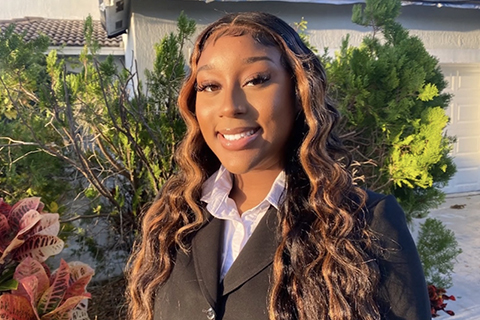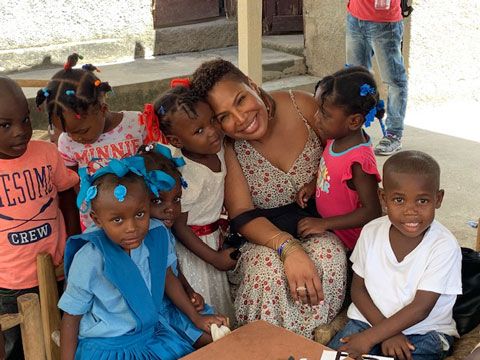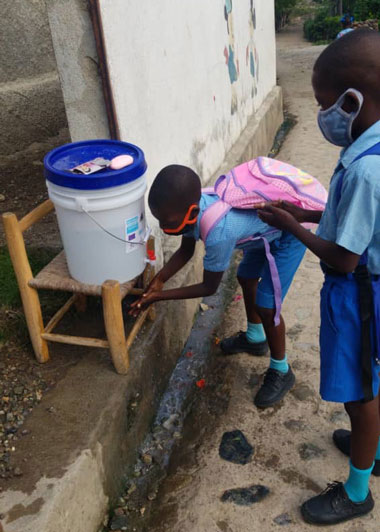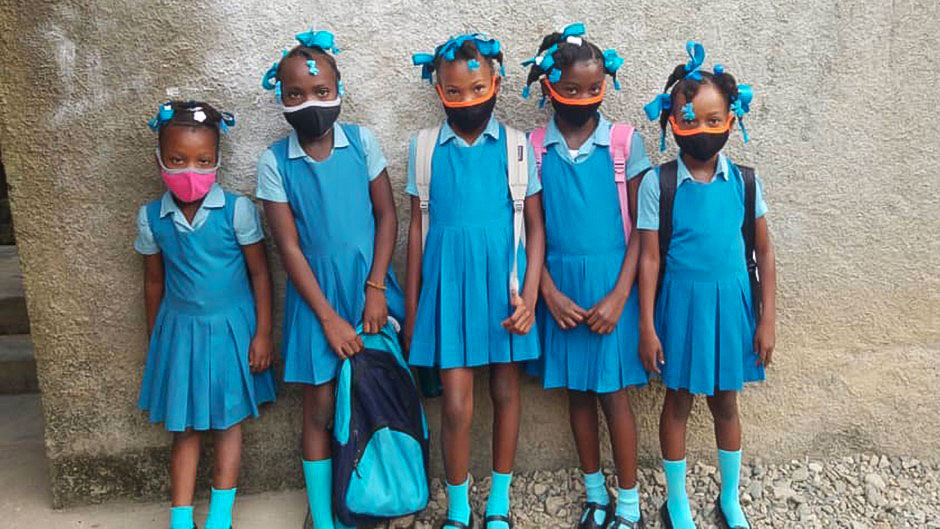Nestled in the foothills of Haiti’s northern mountain range, the free elementary school in Milot has no running water, no electricity, and no roof over the makeshift classrooms that extend beyond the old, three-room house. When it rains, children sit in puddles.
Yet despite the absence of such basics, the roughly 150 students now have improved health, an invaluable resource which the historic community of about 10,000 owes in large part to a project implemented by University of Miami senior Diane Stephen.

Six months after Stephen, a public health and health sciences major at the School of Nursing and Health Studies, introduced monitoring, handwashing, and other measures aimed at curtailing communicable diseases at Ecole Marie Claire Heureuse de Milot, the incidents of scabies, pink eye, lice, diarrhea, ringworm, and viral infections that were common at the school—and too often brought home—have all but disappeared.
“Diane’s work left a huge and lasting impact,” said Jennifer Charles, a physician’s assistant who, with the help of Jude Dhaiti, a longtime data analyst with the School of Nursing and Health Studies, founded the nonprofit HER for Humanity to save the school from closing. “Almost any day, we would have five kids in a room with rashes, or fevers, or lesions. Now such incidents have dropped to maybe two a month. She had tremendous results.”
Stephen, a civic scholar with the University’s Butler Center for Service and Leadership and Office of Civic and Community Engagement, decided to develop a school-based intervention for her required community project last March, just as the novel coronavirus pandemic put much of the world at a standstill. Forced to stay at home and continue her classes remotely, she initially proposed raising money to buy and donate masks and other infection-fighting supplies to Haiti, a place she has close ties to but only visited once. Her parents, who immigrated to Broward County as young adults, were born in or near Milot, the first capital of Haiti, and the site of some of the country’s most treasured landmarks.
She named the project Operation Lakay, which means “home” in Creole, because she pursued it from her own house for her ancestral home, with guidance from Ashley Falcon, assistant professor of clinical, whose course in Public Health Statistics would prove essential.

But after discussing her idea with Charles, also the daughter of Haitian immigrants who began going on medical missions to Haiti after the catastrophic 2010 earthquake, Stephen realized Operation Lakay needed to meet the most basic tenet of public health. It needed to produce enduring change.
“Public health is all about preventing rather than treating disease,” said Stephen, who hopes to be a physician and work for a philanthropic endeavor one day. “And Jennifer made me realize that while donating supplies is nice, it’s a temporary fix, not a solution. She also helped me understand that while COVID is a big concern here, it’s not a priority in Haiti because there’s so little testing for it, and there are so many other health concerns with so little access to health care.”
With Charles’ help, Stephen focused on identifying the health issues most prevalent at the pre-K through fifth grade school and developing a tracking and triage system to monitor and treat the students. No one had kept records, but the maladies weren’t hard to spot: pink eye, scabies, coughs, running noses, nausea, vomiting, ringworm, and lice. Stephen also raised nearly $1,000, mostly from family and members of her church, and used half to pay for thermometers, masks, hand sanitizer, soap, all-purpose cleansers, bleach, and wipes to curtail the spread of those infections. She donated the remainder to school programs.
Today, teachers, staff, and students at the school ritually follow the same protocols. Everyone wears masks and frequently washes their hands with soap—from new buckets equipped with spigots that dispense unsullied water. Teachers and staff also sanitize seats and tables before each class, and scan faces for sniffles, rashes, or other telltale signs of infections.

And now, anytime a student shows signs or symptoms of infection or illness, it’s documented with photographs in a medical incident report that is electronically shared with medical professionals affiliated with HER for Humanity and, when necessary, nearby Hôpital Sacré Coeur, which has served North Haiti for decades.
“The whole point was not to treat every illness the same way, to keep track of who got sick, and to intervene when needed,” Stephen said. “And it worked. Every single month, there was a decrease in the number of people who got sick, in the cases referred to the hospital. I can’t begin to describe the feeling. I was overjoyed—not only that I was able to help 150 children but also the staff. For them it was eye-opening. We all could see how one little intervention in a population could affect the whole community.”
There was no joy the first time Charles visited the school in 2018, during her weeklong medical mission to Hôpital Sacré Coeur with Nicklaus Children’s Hospital. Asked to serve as a translator, she had to convey the news that the school had lost its funding and would soon close. But after Charles returned to South Florida heartbroken, her boyfriend, Dhaiti, a key organizer of the School of Nursing’s mission trips to Haiti’s Central Plateau, began asking questions.
“He’s a data guy, so he wanted to know how many classrooms they have. How many children? What do the teachers get paid? What are their needs?” Charles recalled. “When I had the answers, he made me a spread sheet, and said, ‘This won’t cost more than $1,200 a month to run. We can do fundraisers, write grants, and keep the school going ourselves.’”
A month later, Charles established HER (for Health, Education, and Resources) for Humanity, and invited other professional women who were similarly interested in philanthropic causes to join the board. She has little doubt that, one day, Stephen will be a board candidate, too. If so, they both have Dhaiti, and his passion for doing good at the nursing school and in his homeland, to thank.
A former adviser to the Haitian student organization Planet Kreyol, Dhaiti met Stephen while judging its Mr. and Miss Planet Kreyol pageant in 2019. Until Stephen was crowned Miss Planet Kreyol, neither knew of the other’s affiliation with the nursing school or connection to Haiti. Soon after, Stephen sought Dhaiti’s help with her capstone project, but when he read her proposal, he connected her to Charles.
“I knew they’d be a good match,” Dhaiti said. “They both pretty much have the same interests, and now Diane knows the magic words. To really help a community, it’s all about education and sustainability. I can see how she grew and how her project evolved into a lasting solution.”

